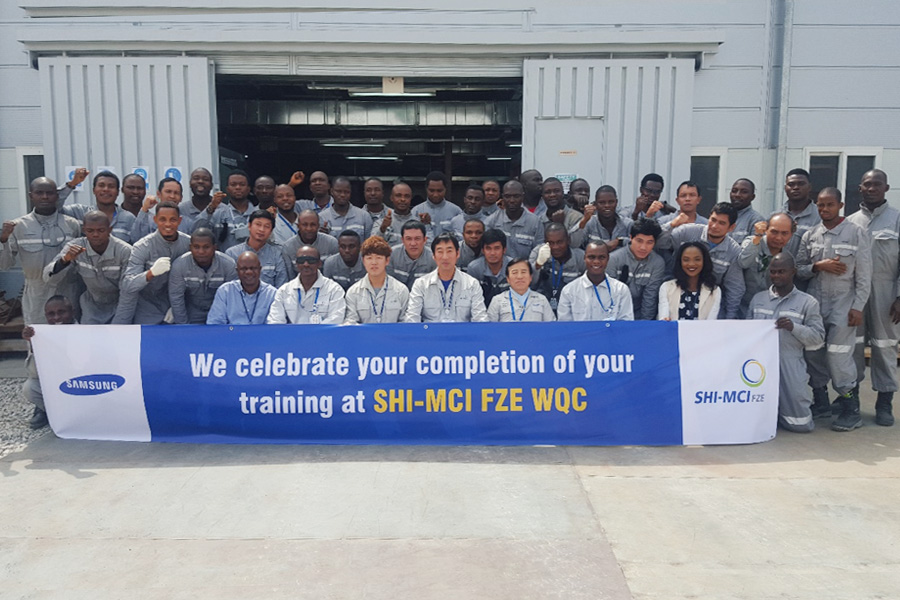Welding expert explains why welding is important for Nigeria

Nigeria’s ongoing economic development is one many countries have made before. This well-trodden path has lessons which may very well accelerate Nigeria’s own journey. One country which has reached the status of global manufacturer is Korea, a world leader in heavy industry. Getting to this stage meant investing to upskill its people so as to be able to undertake high-value work. One skill which above many others has proven its worth across a wide-range of applications is welding. In order to explore this skill in greater detail, we interviewed an expert welding trainer from Korea to share his insights.
Mr. Kyoungtaek Lim is a Welding Expert at Samsung Heavy Industries’ Geoje Technology Research Institute in Korea. He had also been a welding instructor at the Welding Qualification Centre (WQC) set up by Samsung Heavy Industries Nigeria (SHIN) in Tarkwa Bay, Lagos. Through the lens of his own international experiences, he is keen to reveal fresh insights into what will help Nigeria work towards a prosperous future.
Good training in welding includes learning theory as well as hands-on practice. Korea’s welders are capable of using all welding techniques that have been developed, meaning they can be applied across all industries, no matter how complex. Currently, Nigeria does not have sufficiently skilled welders for Arc welding (convergence welding), which demands the implementation of metal 3D printers, artificial intelligence and welding robots. This is a long term goal for Nigeria and in order to get there, the interim steps require a focus on the development of manual welding. “From there, Nigeria could easily work her way up to various scientific technologies, and SHIN could play its part in leading development in such areas by applying the available technological knowhow from its more advanced Korean counterpart”, he adds.
Mr. Lim worked for Samsung Heavy Industries Nigeria from 2015 to 2018, as an instructor at the WQC in Lagos. Accredited by the International Institute of Welding (IIW) as an “Approved Training Body”, the WQC offers certified courses in international fillet, plate and tubular welding. Mr. Lim proudly remembers selecting and upskilling over 600 Nigerian welders during his tenure and witnessing the successful certification of the WQC as an approved international training body under the IIW.
Mr. Lim’s job also required him to frequently visit different places in Nigeria such as Lagos, Ogun State, and Portharcourt. He observed that the workforce in Lagos working for the SHI-MCI fabrication and integration yard and upstream oil and gas services company Nigerdock exhibited high adaptability to welding. He believes this was largely due to the companies’ efforts to introduced systematic training courses for advanced welding techniques; “I therefore strongly believe that the 600 Nigerians that were educated and upskilled at SHI-MCI will greatly contribute to the overall development of welding skill in Nigeria”, he says.
Internationally, welding training standards are based on guidelines from the AWS (American Welding Society), ISO standards and Europe. Given that most of these guides are written in English which Nigerians already have a good command over “if Nigeria is able to resolve its limitations in infrastructure and provision of welding education to its people, I believe Nigeria would be able to adapt and apply the international guidelines to their production faster”, he observes.
SHI-MCI’s WQC works in close partnership with the Nigerian Institute of Welding (NIW), the local authorized accreditation body of the IIW. The NIW’s goal is to promote the teaching of welding skills in line with the IIW standard. Mr. Lim believes that if the Nigerian government engages further with NIW, it will lead to a great leap in Nigerian welding skill development as well as increased business opportunities for industries in Nigeria. Citing Korea as an example, he mentions how relevant government ministries, research organizations (such as universities and vocational training institutes) have partnerships with large corporations to ensure mutual development and growth. Recently, welding has also been selected as one of the top five national technologies in Korea, pushing the government to give even more importance to the research and development of welding technology.
The greatest driving force and asset for Nigeria, however, is the innate passion and dexterity of Nigerians, says Mr. Lim. “I truly applaud the passion of Nigerians. Life indeed is hard for Nigerians as few have money to spare and getting loans from the bank is difficult due to the high interest rate. I would like to share the story of Mr. Innocent, for instance. He joined as a helper who did basic cleaning jobs at the WQC. He had so much passion to learn welding that during his break, or in between shifts, he learned how to weld. The Korean welding expert Daesoo Ji personally taught him the skills, moved by his passion.” Mr. Innocent later applied for SHI-MCI’s welding course and passed the interview – the happiest moment he had ever experienced in his life.
Mr. Innocent’s story is one of many. “Nigerians' passion for work can be easily measured by seeing how they commute from home to work”, continues Mr. Lim. “I once confronted a student for being late to work. I later learned that he was late because the van he had used to commute that morning had been attacked, all the passengers had been robbed of their belongings, and the van driver was shot to death. Even so, he came to work to learn and I decided to give him his monthly salary from my very own savings because I was deeply touched by his passion and diligence.”
As a final word of advice to welding trainees, Mr. Lim emphasizes the need for both the practical as well as theoretical knowledge of welding. “Globally, the labour market for welding is in a mature state, thus only highly skilled welders can thrive internationally, and to be 'highly skilled' means excelling both practically and theoretically.”